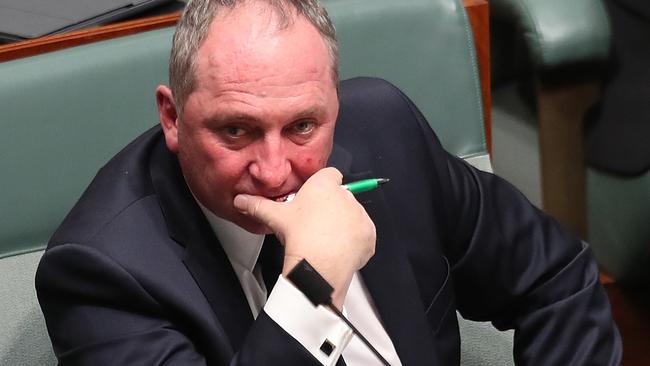Party goes on but Barnaby’s story reads like a tragedy


As Barnaby Joyce’s private life exploded into the public realm with the revelation that he fathered a child with his former staff member, Vikki Campion, he sat down with the ABC’s Leigh Sales for an interview.
A stern-looking Joyce insisted his private life should not be a matter of public interest.
“I don’t think it profits anybody to drag private matters out into the public arena,” he said in February. “It’s a private matter and I don’t think it helps me. I don’t think it helps my family. I don’t think it helps anybody in the future to start making this part of a sort of a public discussion. So, as much as I can, I will keep private matters private.”
How times change. Soon Joyce was more than happy talking to newspaper journalists and was interviewed alongside Campion for a highly paid tell-all interview with the Seven Network in June. It was awkward, to say the least.
The soap opera is rolling on with the publication of Joyce’s memoir, Weatherboard & Iron (New Holland), which should earn him a few more bucks. Early chapters meander through his upbringing, schooling, work as an accountant and entry into politics.
There are mildly interesting chapters on country life, agriculture and infrastructure, if you like that sort of us-versus-them, homespun, provincial rhetoric. And there are chapters that deal with party politics, campaigning, the media and Johnny Depp’s dogs.
The more interesting, yet troubling, parts of the book are about Joyce’s private life that he characterises as “salacious” and “voyeuristic”. He delivers in spades. The book paints a disturbing picture of life in Canberra where politicians gain weight, lose touch and their family lives are wrecked. He writes in detail about his marriage breakup and relationship with Campion.
Joyce is frank about his “self-implosion”. He spiralled into depression, took to booze and pursued women.
“When I was at home I was a lie, and when I was in Canberra I was ashamed,” he writes. “Winston Churchill had his black dog; mine was a half-crazed cattle dog, biting everything that came near the yard.” He even prayed late at night from “a special rock” on Canberra’s Red Hill.
The book shows that Joyce should have resigned as deputy prime minister rather than hanging on for weeks damaging the government. He always knew he would have to go “because of the incongruousness of my position with the pregnancy”. He also acknowledges “it was no secret” his marriage was over before the New England by-election, yet he refused to confirm it until after — “I had to play the game”.
Joyce is not the first National Party leader to write a memoir. Earle Page’s memoir, Truant Surgeon, was published posthumously in 1963. Arthur Fadden wrote one of the best political memoirs, They Called Me Artie, published in 1969. John McEwen had his oral history interview with the National Library turned into a memoir, His Story, and privately published in 1983. (It was republished by the Nationals in 2013.)
These former leaders — also prime ministers — were giants of Australian politics. They had authority and credibility. They wielded significant power. Page’s take-down of Billy Hughes in 1923 and condemnation of Robert Menzies in 1939, and McEwen’s veto on Billy McMahon becoming prime minister are legendary. But they were also achievers and left significant policy legacies. Their memoirs are important additions to the historical record.
The latest Nationals memoirist is not in their league. Joyce’s book is a joke by comparison. If Page, Fadden or McEwen were alive today they would be appalled by the damage done to their party by Joyce. It is unthinkable that the other great Nationals leaders — Doug Anthony, Ian Sinclair, Tim Fischer, John Anderson and Mark Vaile — would have selfishly treated their party, and the voters, in this way.
The suggestion that Joyce has any political currency, and could be an asset to the government at the next election, is beyond mad. The Nationals constituency is socially conservative. Even rusted-on supporters surely would be horrified by his behaviour.
Joyce may have a few supporters left in the partyroom, but he’d have almost certainly been the first Nationals leader removed if he had tried to hold on. It is absurd to think, as he did, that he could survive the metastasising scandal. Even now, six months after his private life became public, he remains a distraction as he promotes his sad and silly book.
His latest threat to cross the floor over the national energy guarantee is emblematic of Joyce’s degeneration from being a leader with distinctive talents to being a wrecker and spoiler dwelling on the backbench. He should never lead the Nationals again. And it would be a mistake to return him to the ministry.
Joyce’s personal and political life is tragedy writ large. His memoir reveals a deeply troubled man. It makes for sad reading. It is a pity because, like others, I regarded him as a talented politician with unique appeal and great potential. He should forget about political rehabilitation. His credibility is shot. He should leave parliament at the next election.


To join the conversation, please log in. Don't have an account? Register
Join the conversation, you are commenting as Logout